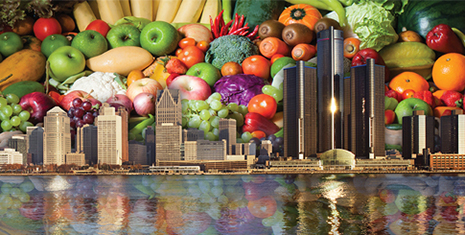Despite Detroit’s past financial worries, its two terminal markets—the Detroit Produce Terminal and the Eastern Market—have remained relatively immune to economic turmoil. As the Motor City continues its revival, business keeps getting better and the markets are adapting to trends and shifting consumer demand.
Big-Time Benefits
Since the early 1900s, the Detroit Produce Terminal and the Eastern Market have played a vital role in the produce industry across the Midwest. When it comes to serving retail and foodservice customers throughout the region, the two markets work as a partners more than rivals. “There’s a lot of trading that goes on between the markets,” confirms Dominic Russo, a buyer for Rocky Produce, Inc. at the Detroit Produce Terminal. “We have several customers that operate out of the Eastern Market. There’s great competition here, but there’s enough business for everybody.”
The strengthening economy has certainly helped, especially being just two years out from the Motor City’s well publicized bankruptcy. “The Detroit economy is improving, and it’s improving our business,” says George Horkey, owner of Roscoe & Horkey Farms, Inc., a grower, shipper and packer at the Eastern Market.
Nate Stone, general manager and COO for Ben B. Schwartz & Sons at the Detroit Produce Terminal, echoes this positivity. “Detroit is so far off the bottom, it’s going to take the rest of the world a little while to understand it,” he enthuses. “We’ve seen major improvement to the point where people are beginning to visit the city on a regular basis. We’re seeing new restaurants and new investments,” he notes. “It’s amazing how fast it’s happened.”
Dominic Riggio, president of Riggio Distribution Company at the Detroit Produce Terminal, says, “Looking at our numbers, we continue to see growth in categories and overall. There’s a lot going on with Detroit that is positive, especially in the downtown area with developments and new companies and businesses coming into town.”
There’s also that substantial trading partner nearby. “Our area is remarkable and probably underestimated by people unfamiliar with the geography,” adds Stone. “We’re just a bridge away from Canada, literally, which is a huge advantage.”
Top Trends
Wholesalers on Detroit’s terminal markets have responded to various trends over the past year, most related to consumers making more healthful choices. Demand continues to climb for locally grown, organic, and ethnic choices, as well as greenhouse grown commodities and surprisingly, Brussel sprouts.
“Everybody is eating more produce,” says Stone, “and there are great items coming into the market—including a lot of exotics and tropical and ethnic foods.” This is backed up by a 2016 Institute of Food Technologists study, which found 78 percent of consumers were making a demonstrated effort to eat more fresh foods. Over the past decade, consumption of fresh foods grew by more than 20 percent; plus, shoppers were buying up to 10 percent more fresh ingredients than they were three years ago. For Stone, the trend has also fueled another benefit: “The business is fun all over again.”



